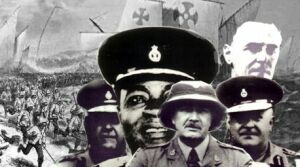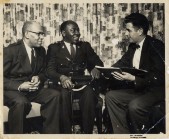E.R.T.
Madjitey's career in the Police turned out to be the pinnacle
of his life. If ever he turned out successful, it
stemmed from the two cardinal principles he strongly
believed in:
i)
never procrastinating and
ii) giving the
best in whatever he did.
If
ever there was a proponent of the concept, 'whatever is
worth doing is worth doing well', it was Madjitey. Indeed so much did he believe in this cardinal principle that, despite
the great pain he was suffering due to abscess in
both legs he still went ahead an sat for his final school
certificate exams in bed. He always used to maintain that if
he had not adopted that attitude, he would never have turned
out the first African (both in Sub-Saharan Africa and the whole of the British
Commonwealth) to head a Police Force.
If we his children had a dime for
anytime we heard the phrase "Primus inter
Pares", I am sure we would all be millionaires.
much did he believe in this cardinal principle that, despite
the great pain he was suffering due to abscess in
both legs he still went ahead an sat for his final school
certificate exams in bed. He always used to maintain that if
he had not adopted that attitude, he would never have turned
out the first African (both in Sub-Saharan Africa and the whole of the British
Commonwealth) to head a Police Force.
If we his children had a dime for
anytime we heard the phrase "Primus inter
Pares", I am sure we would all be millionaires.
This is however,
not to say that the road to the top was not rough for him. He
wrote in the script of "Behind The Scene" [a book he once contemplated writing]:
"The
non commissioned officers and inspectors under whom we
worked all seemed to have been briefed to sabotaged the
scheme under which we were enlisted. I found most of them
uncooperative and little mistakes we made were magnified out
of proportion".
He
always used to recount with great humor an incident which
happened between him and a barracks Sergeant when he was
stationed at Christiansburg, Osu as a constable:
"
Our barracks sergeant was an elderly man called Batawule
Lorso. He was popularly known as "Fowl Sergeant" because for a
long time he had been employed as a caretaker of the
Commissioner's poultry at the Police Training School. He and
I did not get on too well because, he tried to show off and
had little respect for educated men. One morning when I
returned from night duty, he ordered me to go to the main
barracks to attend morning parade which was due to start in
45 minutes. Fortunately I had a clean kit so, I hurriedly
got ready and proceeded to the Central Barracks only to be
informed there was no parade. I returned to Christianborg
and an argument ensued between Lorso and myself. He
immediately placed me on a charge of insubordination. Well
aware of the fact that I might go to England for higher
training, provided I maintained a good record, he was well
pleased to have the opportunity of staining my record to the
extent that he ignored all the pleas by my colleagues to
drop the charge. This was a Tuesday and the charge was
supposed to be heard on the next Friday. On Thursday, at
about 10:30 a.m., I received a telephone call summoning me
to report to the Commissioner of Police at headquarters. The
first thing that came to my mind was the charge and I became
very worried. I arrived at headquarters at 1:45 p.m. and
fifteen minutes later, was marched to the Commissioner's
office where he informed me that I had been promoted to the
rank of Sub-Inspector. Of course on my return to
Christianborg, there was no immediate sign of the
sergeant".
A
few days later he re-surfaced and apologized declaring "all
that charge matter, ibe play" and that he had already
destroyed the charge papers.
Following
his promotion to Sub Inspector, Madjitey was posted to Kumasi where he served
for a year. Naturally he faced a lot of opposition from the
European officers who were against the new Africanization
policy. Nevertheless, in May 1946 Madjitey proceeded to Preston, United
Kingdom on a scholarship which attached him to the Lancashire
Constabulary for a years course in general Police duties.
Upon
return to the Gold Coast and after a short delay, he was
promoted Assistant Superintendent of Police and posted to
Takoradi (in the Western Region) as an Immigration Officer. In August 1948, he was
transferred to the Accra to take charge of the "B"
district and appointed honorary 'Aide-de-Camp'
to the
Governor of the Gold Coast. In 1949 he was transferred to Sekondi
(also in the Western Region). The
same year he married a student of the Krobo Girls Training
College
Miss Vera
Korleki Scales.
In
1952, Madjitey proceeded once more to the UK where he did the
senior officers detective course with the London MEtropolitan
Police in Scotland
Yard. On his return in 1953 he was posted shortly to
Tarkwa but returned to Sekondi as second-in-command of the
Western region. On December 1st, 1953
 he was promoted Superintendent of Police. In 1955, he attended
the senior officer's course at the
Police Staff college at Ryton-on-Dunsmore
in Coventry. On his return, Madjitey was posted to the Eastern
Region as second-in-command.
he was promoted Superintendent of Police. In 1955, he attended
the senior officer's course at the
Police Staff college at Ryton-on-Dunsmore
in Coventry. On his return, Madjitey was posted to the Eastern
Region as second-in-command.
In
1956, he assumed command of (his native region) the Eastern
region with the acting rank of Chief
Superintendent thus becoming the first African to command
a Police region. The same year, he was nominated for the
Colonial Commissioners course at Bramshill.
Upon completion at Bramshill, E.R.T. Madjitey was awarded a scholarship to the
United States under the joint auspices of the United States
International Education Program and the International
Association of Chiefs of Police. In America, Madjitey was
attached to various Police organizations including the
FBI,
CIA,
Secret Service, Columbus, Ohio City Police, Grand Rapids,
Michigan City Police and the Detroit City Police to mention a
few. He returned to the Gold Coast after a year and took part
in Ghana's independence celebrations in
March 1957. He took charge of Accra Division 'B' for sometime
and was later posted to Police Headquarters as Assistant
Commissioner of Police. On March 16th, 1958, E.R.T. Madjitey was appointed
Deputy Commissioner of Police.
On
9th October 1958, E.R.T. Madjitey was appointed Commissioner
of Police (the rank of Inspector-General of Police
had previously reverted to Commissioner of Police)
thus becoming not only the first Ghanaian but also the first
African South of the Sahara and in the whole of the British Commonwealth
to command a
Police Force. He served in this capacity from 1958 to 1964
when [and as he indicated in the script of a book he once contemplated
writing] due to an attempt on the life of the President of Ghana Kwame
Nkrumah by Constable Sam Ametewe,
"I
served as Head of the Ghana Police Force [Commissioner of
Police] from 1958 to 1964 when following my opposition to
Nkrumahs plan for disintegrating the Police Service under
the guise of reorganization and my blunt refusal to be privy
to the fabrication of evidence against Tawiah Adamafio, Ako
Adjei and Cofie Crabbe, Nkrumah removed me and seven other
senior officers from office, when a constable made an attempt
on his life in circumstances which should have been obvious to
the meanest sense that the constable acted entirely on his own
volition to avenge the wrong done to him by Nkrumah through
the unlawful detention and persecution of three of his close
relatives."
E.R.T. Madjitey
and the 6 top most in the Police Administration were removed from office [for reasons
not established till today] and
subsequently put in detention under the C.P.P. governments
Preventive Detention Act.
During
this illustrious career, E.R.T. Madjitey received many
medals and
citations
also serving in many honorable positions. In recognition of his
professional excellence and exceptional devotion to duty, Her
Majesty Queen Elizabeth of Great Britain conferred a Baronage
- CBE (Commander of the Most Excellent
Order of The British Empire) on him in 1960.
E.R.T.
Madjitey was also awarded the Congo medal (for successfully heading
United
Nations Peace keeping missions during the the crisis in the Congo),
Queens medal for meritorious duty, the Republican medal,
Freedom key to the City of Grand Rapids, Michigan to mention a
few. He was also a member of the International Association of
Chiefs of Police
 much did he believe in this cardinal principle that, despite
the great pain he was suffering due to abscess in
both legs he still went ahead an sat for his final school
certificate exams in bed. He always used to maintain that if
he had not adopted that attitude, he would never have turned
out the first African (both in Sub-Saharan Africa and the whole of the British
Commonwealth) to head a Police Force.
If we his children had a dime for
anytime we heard the phrase "Primus inter
Pares", I am sure we would all be millionaires.
much did he believe in this cardinal principle that, despite
the great pain he was suffering due to abscess in
both legs he still went ahead an sat for his final school
certificate exams in bed. He always used to maintain that if
he had not adopted that attitude, he would never have turned
out the first African (both in Sub-Saharan Africa and the whole of the British
Commonwealth) to head a Police Force.
If we his children had a dime for
anytime we heard the phrase "Primus inter
Pares", I am sure we would all be millionaires. 